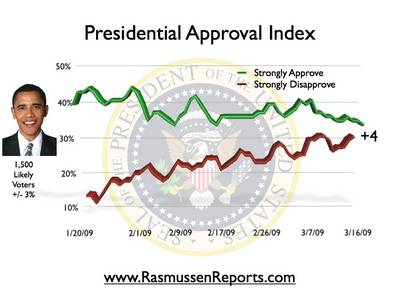|

From $1 trillion in debt
to $4 trillion in debt
in six weeks
|

|
|
|
|
|
event |
description |
Presidential
Approval
Index |
 |
|
Tea Parties Tax Revolt |
With a few notable
exceptions, the national media has ignored the tax revolt movement
against the porkulus package, omni-pork spending bill, and bottomless
bailouts that began in Seattle on President’s Day; continued in Denver
on the day of the Generational Theft Act signing; spread to Mesa AZ
during President Obama’s massive mortgage entitlement push; spurred
protest in Overland Park KS; and evolved into the Tea Party movement
across the country.
But local politicians and local newspapers/TV
are definitely
on notice. Thousands of folks converging in places like St.
Louis (1,500), Greenville (2,000), Fullerton (est. 15,000), and
Cincinnati (5,000) are getting harder to ignore.
And now, it
seems, word is getting around in Washington. The White House, the
NY Times (which has mocked the tax revolters) tells us, is worried about
a populist backlash against bailout-mania.
See the
list of 150 Tea Parties -- cursor down -- there's one near you. |
|
No Hope, Just Bellyaching |
"The country
looks
to the President on occasions like this to be reassuring to the nation. Some Presidents do it well, some Presidents don't."
That's how
ABC's Peter Jennings assessed President George W. Bush's performance on
Sept. 11, 2001. The criticism was superficial, shortsighted and unfair,
given that President Bush's finest moments came in rallying the country
after 9/11 -- not scapegoating the previous administration.
Bush
didn't spend the next few months claiming that he "inherited" a national
security mess, nor did he complain about the economy which faltered in
two of the final three quarters under President Clinton before
contracting again in Bush's first year.
Likewise, President
Reagan didn't whine about the soaring unemployment and burgeoning
inflation that awaited him after President Carter's tenure.
These men understood that they campaigned for the opportunity to serve
as President and to lead by making difficult, sometimes unpopular
decisions.
That's why Obama's transformation from a candidate of
hope and change to a president of gloom, blame and opportunism is so
disappointing -- even for those who didn't buy what he was selling as a
candidate. His ability to truly inspire 53% of the voters seemed, at
least, refreshing.
Now, the Obama team takes every opportunity
to complain that they "inherited" a deficit, an "economic crisis," and
"a big mess."
No hope, just bellyaching. |
|
Does He Know What He Is Doing? |
The furor over
the huge federal spending under Obama -- a $1.75 trillion deficit, 13
percent -- obscures an even more basic question, does he know what he is
doing?
That is, does Obama know how to do anything other than
spend?
His stimulus package, of course, took no special ability.
He left the details to Democrats in Congress. But his two other major
initiatives -- his banking- and mortgage-relief plans -- are both flawed
and unlikely to solve their respective problems.
Indeed, they're
so wide of the mark as to prompt questions not of Obama's ideology but
of his basic competence.
The bank-bailout plan seems to be
largely stillborn. Having wished that the private sector would flock to
invest in toxic assets if offered the right incentives, the Treasury
secretary is still hoping. Crossing his fingers seems to have replaced
effective policy in his planning.
To date, no massive infusion
of private-sector capital seems in view and Washington is doing little
more than writing checks to prop up the failing banks. That doesn't take
a genius. But the difficult task of relieving the banks of toxic assets
so they can rekindle the flow of loans seems to be beyond the ability of
the president and his administration.
It was Clinton-era Housing
Secretary Henry Cisneros who urged Fannie Mae to spend 42 percent of its
money buying mortgages for lower-income people and who suggested that
they no longer require down payments. And it was his successor, Andrew
Cuomo, who upped the ante to 50 percent of the Fannie Mae portfolio.
After Democrats inveigled people to buy homes they could not afford,
how can they justify passing a plan that excludes them from assistance?
It appears that Obama is at sea when it comes to financial
policy, economic-recovery planning and credit-rescue efforts. We're
stuck not only with a socialist but seemingly an incompetent one.
More
. . . |
|
GIVE Act |
The Senate is
working on the
Kennedy/Hatch Serve America Act of 2008, and the House is working on a
similar bill, called the Generations Invigorating Volunteering and
Education (GIVE) Act (H.
R. 1388).
Each would more than triple the number of
AmeriCorp volunteers from 75,000 to 250,000, at an estimated cost of a
billion dollars a year.
House Education and Labor Committee
Chairman George Miller, D-Calf., said his committee will act on the bill
this week, bring it to a vote by next week, with the goal of getting it
to the president's desk before the April recess.
"This bill is
going to the president's desk because he's absolutely captured the
imagination of America to create a new generation of volunteers to
expand the opportunities for volunteers from middle school to retired,"
Miller said.
The bill would also create "green" opportunities --
including a Clean Energy Corps to focus on environmental conservation. It would also create a Healthy Futures Corps, focusing on health care; a
Veteran Services Corps, focusing on services for military veterans; and
an Education Corps.
One of the participants said, ""It's a
construction job, but the skills aren't construction -- it's volunteer
management, leadership..."
There's Obama's 3-pronged attack again -- environment, health and
education. Watch for those three in everything he does.
And
it dovetails nicely with this:
On July 2nd, 2008, Obama spoke in Colorado Springs and hit themes of
national service, foreign policy, and national security. In that vein,
Obama proposed a rather extraordinary idea -- that the US should spend as
much money on a civilian national security force as it does on the military.
(video)
"We cannot continue to rely on
our military in order to achieve the national security objectives we’ve
set. We’ve got to have a civilian national security force that’s just as
powerful, just as strong, just as well-funded."
Just this past week while speaking at the dedication of Abraham
Lincoln Hall at the National Defense University in Washington, D.C.,
Obama said this:
"… And that’s why my administration is committed
to renewing diplomacy as a tool of American power, and to developing our
civilian national security capabilities… … We have to enlist our
civilians in the same way that we enlist those members of the armed
services in understanding this broad mission that we have."
Obama
spends a lot of time thinking about this "civilian national security
force."
And, exactly what is "this broad
mission that we have?" You wanna spell that out for me,
Obama? |
![]()
©
Copyright Beckwith 2009
All right reserved
|


